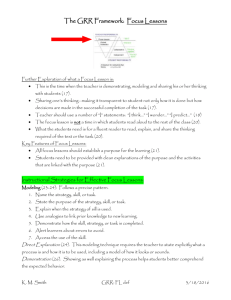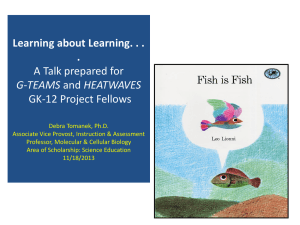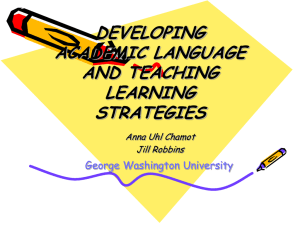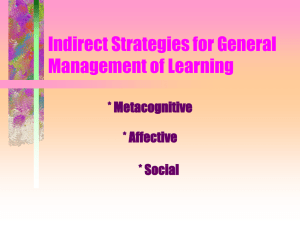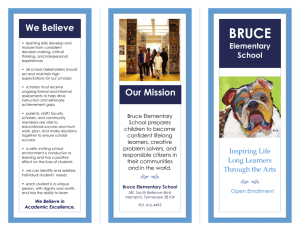Helping Students Become Intelligent Novices
advertisement
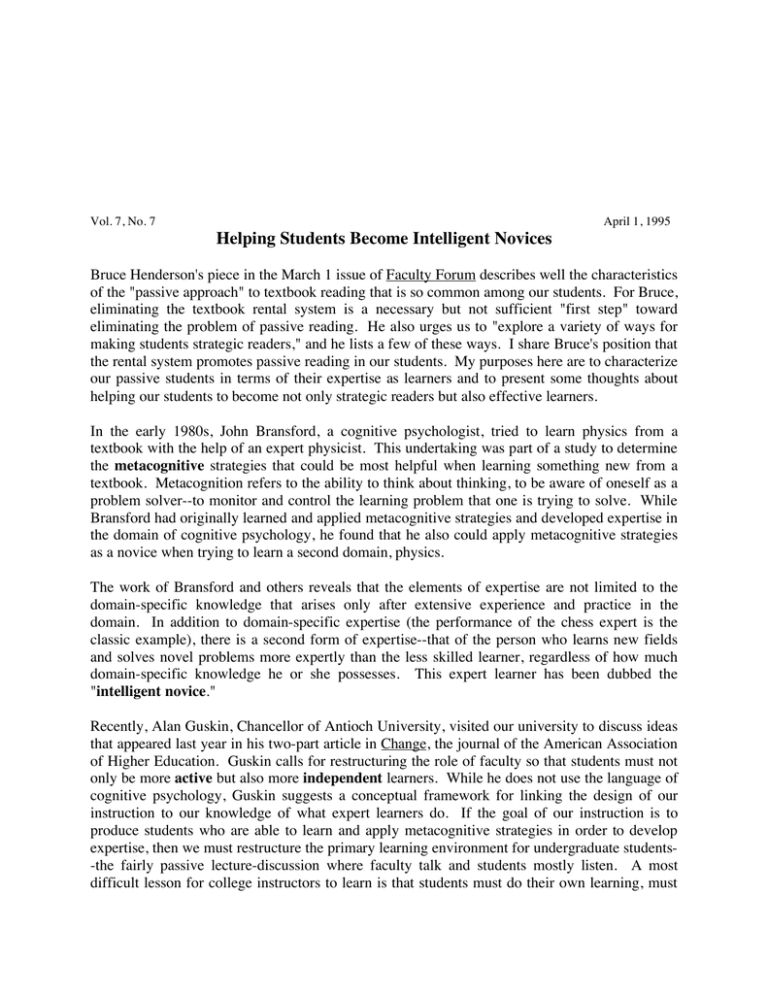
Vol. 7, No. 7 April 1, 1995 Helping Students Become Intelligent Novices Bruce Henderson's piece in the March 1 issue of Faculty Forum describes well the characteristics of the "passive approach" to textbook reading that is so common among our students. For Bruce, eliminating the textbook rental system is a necessary but not sufficient "first step" toward eliminating the problem of passive reading. He also urges us to "explore a variety of ways for making students strategic readers," and he lists a few of these ways. I share Bruce's position that the rental system promotes passive reading in our students. My purposes here are to characterize our passive students in terms of their expertise as learners and to present some thoughts about helping our students to become not only strategic readers but also effective learners. In the early 1980s, John Bransford, a cognitive psychologist, tried to learn physics from a textbook with the help of an expert physicist. This undertaking was part of a study to determine the metacognitive strategies that could be most helpful when learning something new from a textbook. Metacognition refers to the ability to think about thinking, to be aware of oneself as a problem solver--to monitor and control the learning problem that one is trying to solve. While Bransford had originally learned and applied metacognitive strategies and developed expertise in the domain of cognitive psychology, he found that he also could apply metacognitive strategies as a novice when trying to learn a second domain, physics. The work of Bransford and others reveals that the elements of expertise are not limited to the domain-specific knowledge that arises only after extensive experience and practice in the domain. In addition to domain-specific expertise (the performance of the chess expert is the classic example), there is a second form of expertise--that of the person who learns new fields and solves novel problems more expertly than the less skilled learner, regardless of how much domain-specific knowledge he or she possesses. This expert learner has been dubbed the "intelligent novice." Recently, Alan Guskin, Chancellor of Antioch University, visited our university to discuss ideas that appeared last year in his two-part article in Change, the journal of the American Association of Higher Education. Guskin calls for restructuring the role of faculty so that students must not only be more active but also more independent learners. While he does not use the language of cognitive psychology, Guskin suggests a conceptual framework for linking the design of our instruction to our knowledge of what expert learners do. If the goal of our instruction is to produce students who are able to learn and apply metacognitive strategies in order to develop expertise, then we must restructure the primary learning environment for undergraduate students-the fairly passive lecture-discussion where faculty talk and students mostly listen. A most difficult lesson for college instructors to learn is that students must do their own learning, must map their own intellectual journey from novice to expert. Henry Steele Commager, the great historian who was enormously concerned about teaching and learning in higher education, cautions us: "There is a great delusion that everything must be taught instead of learned." No matter how beautifully organized and tailored a lecture, it only transmits or disseminates information to students. In the lecture, the information itself and not how it is acquired or how it might be used is focal. As we prepare to teach, we learn a great deal as we actively put information into our own words and formats. Our students typically learn much less, principally, perhaps, how to recognize cues as to what will appear on a test. (Rule 1: copy down exactly what the instructor writes on the board.) This does not in itself suggest that we stop lecturing. It proposes that we give careful thought to the types of learning or expertise we hope to promote and then consider the limited role the lecture can play. The lecture, along with technology-including textbooks--provides us with a means of transmitting and disseminating what is known. But the types of learning and expertise we hope to promote in our students require that they engage in an active process of knowledge construction, not knowledge recording or knowledge absorption. Guskin offers suggestions for how we can make this kind of learning focal in our courses. He urges us to move from an emphasis on learning that occurs primarily in larger groups to a focus on smaller, more intimate groups and independent learning. He urges us to actively model our own learning processes, to participate in intense, small group discussion, to convene cooperative learning teams, to engage in more one-on-one interaction with students, and to establish peergroup, team-oriented learning settings in which students interact independent of faculty. My impression is that the ideas of Bransford and Commager, along with Guskin's call for restructuring the role of faculty, Terry Nienhuis' proposal that we "talk first and foremost about good learning" (in the November 1, 1994 issue of Faculty Forum), and Bruce Henderson's listing of ways for making students strategic readers all contribute to a conceptual framework for linking the design of our instruction to our knowledge of what expert learners do. If we conceive of the typical students in our classrooms as novices who make use of only a limited set of strategies to address the learning tasks with which we confront them, then it becomes clear that how we engage them in learning is at least as important as what we teach. Domain-specific knowledge and skills are necessary to the kind of expertise that we want our students to develop, but are they sufficient? Shouldn't we also pay attention to the metacognitive processes involved in our students' intellectual journey from novice to expert? If teaching is the profession dedicated to helping students learn, then we can arrange the conditions of learning in our courses so that our students can learn to be intelligent novices. John Habel, Psychology Comments or Questions? If you would like to make comments about this essay or ask questions of John please send your questions or comments by the 8th of the month to Terry Nienhuis (FCTE; phone: 7196; WP Mail/Vax: Nienhuis). Please indicate whether you are willing to be quoted or prefer to remain anonymous.
